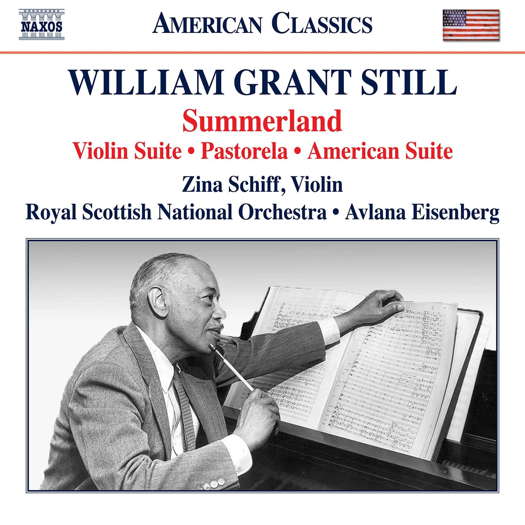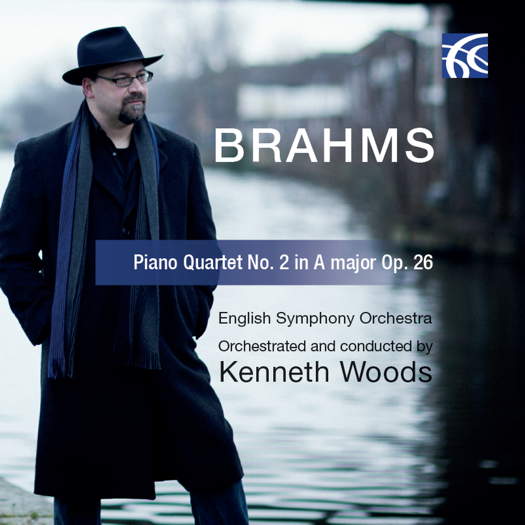 UPDATES: There's a new feature every day at Classical Music Daily. Read about the various ways we can keep in touch with you about what's happening here.
UPDATES: There's a new feature every day at Classical Music Daily. Read about the various ways we can keep in touch with you about what's happening here.

A Rich Tradition
GERALD FENECH listens to orchestral music by American composer William Grant Still
'A peach of an issue, superbly performed, recorded and annotated.'
In William Grant Still's own words: 'I hope that my music can serve a purpose larger than mere music. If it will help in some way to bring about better interracial understanding in America and in other countries, then I will feel that the work is justified.' Born in Mississippi on 11 May 1895, Still grew up in Little Rock, Arkansas, where his mother Carrie moved to be with her family after the tragic death of her husband when William was only six months old. There, Still's doting grandmother serenaded him with hymns and spirituals, while his mother taught high school English. An impish boy with a mother 'constantly molding my character', Still came to value her discipline and firm belief that he 'must amount to something in the world'. When after a decade of widowhood his mother married Charles B Shepperson, a railway postal clerk, Still gained a nurturing stepfather who filled his home with Red Seal opera recordings and introduced him to natural theatre. Next came violin lessons, and the future composer taught himself to play cello, oboe and clarinet. Graduating from high school as class valedictorian, Still enrolled at Wilberforce, the first private historically black university in the States, with the hope of becoming a professional musician.
Still composed nearly two hundred works, including nine operas, five symphonies and four ballets, among other pieces in other genres. He studied with such diverse personalities as George Chadwick and Edgard Varèse, and worked as performer and arranger with W C Handy, 'Father of the Blues'. He played the oboe in the orchestra of Shuffle Along, the blockbuster Broadway show with music by Eubie Blake, featuring Josephine Baker. The composer also worked with such names as Sophie Tucker and Paul Whiteman. He arranged the music for Deep River Radio Hour, and his arrangement of Artie Shaw's Frenesi was one of the bestselling records of all time. He composed the score for the 1936 Bing Crosby movie Pennies from Heaven and for many other films and TV shows in Hollywood. Famed conductors, such as Sir John Barbirolli, Pierre Monteux, Leopold Stokowski and Arthur Fiedler showcased his music. He was showered with many awards, including eight honorary doctorates and three Guggenheim Fellowships, and in 1939 was commissioned to write the theme music for New York's World Fair. Despite the widespread racial discrimination he encountered, Still remained strongly attached to his commitment of composing music 'with heart ... for the people.' Still's hope and faith sustained him till the end and are expressed in the inscription written in the composer's own hand at the conclusion of each of his manuscripts: 'With humble thanks to God, the Source of Inspiration.' Still died on 3 December 1978, leaving behind a legacy of classical forms with jazz and blues idioms inspired by the rich tradition of African American spirituals.
All the items on this programme are world premiere recordings, so I think it would not be amiss if some information were to be forwarded for the benefit of all those interested in this very special music.
Can't You Line 'Em (1940) is based on a folk ballad collected and combined by the Lomax Brothers and published in 1939. The piece captures the rhythm and spirit of the construction gangs, particularly those lining up railroad tracks. Still was a train enthusiast since boyhood, and in later life delighted in handcrafting elaborate wooden toy train sets for his six children. A CBS commission, this piece was premiered on 17 February 1940 with the CBS Radio Orchestra on their network programme American School of the Air.
Listen — William Grant Still: Can't You Line 'Em
(8.559867 track 1, 0:01-1:00) ℗ 2022 Naxos Rights (Europe) Ltd :
Originally composed as the second movement of three Visions for solo piano, Summerland (1936) is Still's delicate description of the serenity and purity of Heaven.
Listen — William Grant Still: Summerland (3 Visions)
(8.559867 track 2, 0:00-0:59) ℗ 2022 Naxos Rights (Europe) Ltd :
Another work originally written for solo piano, Quit Dat Foolnish (1935) conjures up a jazzy romp with the composer's mischievous dog, Shep. Still also wrote a version for solo saxophone and orchestra, which was transposed for this recording by Dana Paul Perna.
In Still's own words, Pastorela (1946) is a tone picture of a Californian landscape, peaceful but exciting, arousing feelings of languor in some of its aspects, and of animation in others, presenting an overall effect of unity in its variety.
American Suite (circa 1918), the composer's first symphonic work, was written when Still was attending Wilberforce University in Ohio. Before leaving for Memphis, Still sent the parts of the American Suite to Frederick Stock, conductor of the Chicago Symphony. In 1998, Still's daughter Judith Anne shared the orchestral parts with Dana Paul Perna, who created the present score.
Listen — William Grant Still: Danse (American Suite)
(8.559867 track 6, 0:00-0:55) ℗ 2022 Naxos Rights (Europe) Ltd :
In April 1939 Senator Harry Schwartz succeeded in convincing the American Government to pass the Appropriations Bill Public Law 18, containing an amendment designating money to train African American airmen. With the financial help of the Julius Rosenwald Fund, the Moton Field in Tuskegee, Alabama, started producing award-winning pilots and units, and by the end of the Second World War, 9,920 pilots had served the American cause. Fanfare for the 99th Fighter Squadron (1945), which resonates with pride, courage and patriotic resolve, was composed in honour of those men who gave everything for the cause of peace and justice. This work was premiered at the Hollywood Bowl by Leopold Stokowski and the Los Angeles Philharmonic on 22 July 1945 in commemoration of the end of war and the valiant service of the Tuskegee Airmen.
Serenade (1957) was originally intended as material for a cello concerto proposed by Still's friend, the famous cellist Gregor Piatigorsky. Instead, it became a commission by the Great Falls, Montana High School Orchestra, with its lush cello writing hinting at its conception.
The Violin Suite (1943), dedicated to Louis and Annette Kaufman, is a musical impression of three works of art. African Dancer is a stunning bronze statue by Richmond Barthe (1901-1989), displayed at the Whitney Museum in New York. Mother and Child is a poignant coloured lithograph by Sargent Johnson (1888-1967), housed at San Francisco's Museum of Modern Art. Gamin is a sassy bronze bust by Auguste Savage (1892-1962) at the Smithsonian in Washington DC. These works were featured in The Negro in Art, a book published in 1940 by philosopher and leader of the Harlem Renaissance Alain Locke (1885-1954), who was Still's friend and champion. The book so impressed Edith Halpert (1900-1970), a Russian-Jewish refugee, visionary and art promoter, that she contacted Locke to promote an exhibition in her Downtown Gallery in New York. The exhibition opened on 8 December 1941, the day after the Japanese attack on Pearl Harbour, but despite the deep sadness that engulfed American society, this first major commercial showing of African American art in New York was a great success. Still rose to the occasion and translated the artists' imagination into music full of verve, tenderness and very often charm.
The beautiful Threnody: In Memory of Jean Sibelius (1965) was commissioned by Fabien Sevitsky for a concert in memory of Finland's national hero, composer Jean Sibelius (1865-1957), on the one hundredth anniversary of his birth. The University of Miami Symphony Orchestra premiered the work on 14 March 1965, and a year later, Threnody was featured in a broadcast by the Finnish National Radio. Still's tribute is a noble and haunting farewell, channelling the spirit and mystique of Sibelius the man and the composer.
Listen — William Grant Still: Threnody: In Memory of Jean Sibelius
(8.559867 track 13, 5:10-6:07) ℗ 2022 Naxos Rights (Europe) Ltd :
This is a marvellously exciting hour of music by a composer of substance whose recorded catalogue is still only average. Hopefully, Naxos' advocacy for Still's oeuvre will induce more labels and listeners to turn to this uplifting repertoire which is as moving as it is entertaining. Do not remain still to Still's sound world. You will be missing an experience and you might come to regret that. A peach of an issue, superbly performed, recorded and annotated.
Copyright © 29 May 2022
Gerald Fenech,
Gzira, Malta

CD INFORMATION - WILLIAM GRANT STILL: SUMMERLAND



